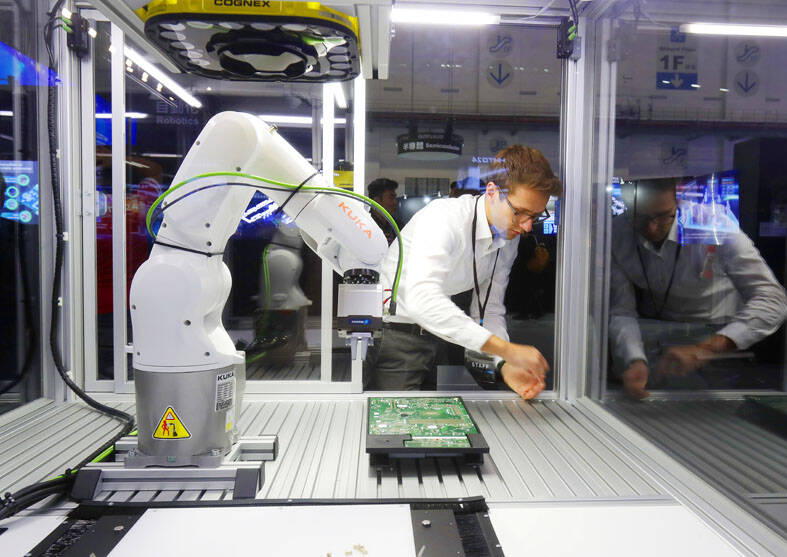The industrial production index expanded 8.85 percent annually to 100.6 last month as robust demand for artificial intelligence (AI) applications and high-performance computing (HPC) devices fueled demand for advanced chips and data centers, the Ministry of Economic Affairs said yesterday.
The index measures the change in the value of output produced by the local manufacturing, mining and utilities sectors, with the manufacturing output, the major pillar of industrial production, growing 9.32 percent year-on-year to 100.51 last month.
Industrial and manufacturing production registered an eighth consecutive month of annual growth last month.

Photo: Chiang Ying-ying, AP
During the first 10 months of this year, industrial production and manufacturing production grew 10.68 percent and 11.11 percent from the same period last year respectively.
“It looks like manufacturing production is on track to grow for the whole of this year, ending two consecutive years of decline,” Department of Statistics Deputy Director-General Huang Wei-jie (黃偉傑) said by telephone yesterday. “The outlook for the first quarter of next year remains unclear. A major uncertainty is the US trade policies under [US president-elect] Donald Trump. We are closely monitoring how it will play out.”
This month, manufacturing production is expected to climb between 5.8 percent and 10.1 percent annually to between 98.08 and 102.08, the ministry forecast.
On a sequential basis, manufacturing production would shrink 2.4 percent in the worst-case scenario due to a disappointing recovery of the traditional sectors, which were affected by China’s economic slowdown and industrial overcapacity, Huang said.
Among the six major industries in the manufacturing sector, three posted an annual output expansion last month, with the electronic components industry reporting the largest increase of 16.47 percent, benefiting from rising demand for HPC and AI devices, which boosted demand for 12-inch wafers, chip design and chip testing and packaging services, the ministry said.
The production of computers and optical products last month rose 4.35 percent annually, thanks to sustained demand for AI applications and semiconductor inspection equipment, the ministry said.
Machinery equipment production expanded 11.06 percent last month, buoyed by robust equipment demand from semiconductor companies.
Demand for machine tools remained sluggish as slower global economic growth depressed firms’ investment in manufacturing equipment, it said.
The production of base metals contracted 3.52 percent last month due to sluggish steel demand worldwide and low-priced steel products from China, the ministry said.
The production of chemical materials and fertilizers dipped 5.01 percent last month as manufacturers cut production to cope with sagging demand. The decline was also a result of disruptions by typhoons last month, it added.
The production of automotive products plummeted 12.59 percent last month, attributable to component shortages and competition from global automakers, the ministry said.

Vincent Wei led fellow Singaporean farmers around an empty Malaysian plot, laying out plans for a greenhouse and rows of leafy vegetables. What he pitched was not just space for crops, but a lifeline for growers struggling to make ends meet in a city-state with high prices and little vacant land. The future agriculture hub is part of a joint special economic zone launched last year by the two neighbors, expected to cost US$123 million and produce 10,000 tonnes of fresh produce annually. It is attracting Singaporean farmers with promises of cheaper land, labor and energy just over the border.

US actor Matthew McConaughey has filed recordings of his image and voice with US patent authorities to protect them from unauthorized usage by artificial intelligence (AI) platforms, a representative said earlier this week. Several video clips and audio recordings were registered by the commercial arm of the Just Keep Livin’ Foundation, a non-profit created by the Oscar-winning actor and his wife, Camila, according to the US Patent and Trademark Office database. Many artists are increasingly concerned about the uncontrolled use of their image via generative AI since the rollout of ChatGPT and other AI-powered tools. Several US states have adopted

A proposed billionaires’ tax in California has ignited a political uproar in Silicon Valley, with tech titans threatening to leave the state while California Governor Gavin Newsom of the Democratic Party maneuvers to defeat a levy that he fears would lead to an exodus of wealth. A technology mecca, California has more billionaires than any other US state — a few hundred, by some estimates. About half its personal income tax revenue, a financial backbone in the nearly US$350 billion budget, comes from the top 1 percent of earners. A large healthcare union is attempting to place a proposal before

KEEPING UP: The acquisition of a cleanroom in Taiwan would enable Micron to increase production in a market where demand continues to outpace supply, a Micron official said Micron Technology Inc has signed a letter of intent to buy a fabrication site in Taiwan from Powerchip Semiconductor Manufacturing Corp (力積電) for US$1.8 billion to expand its production of memory chips. Micron would take control of the P5 site in Miaoli County’s Tongluo Township (銅鑼) and plans to ramp up DRAM production in phases after the transaction closes in the second quarter, the company said in a statement on Saturday. The acquisition includes an existing 12 inch fab cleanroom of 27,871m2 and would further position Micron to address growing global demand for memory solutions, the company said. Micron expects the transaction to